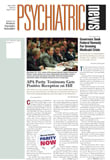Two research reports presented at the 23rd Collegium Internationale NeuroPsychopharmacologium Congress in Montreal in June indicate that isolation of active, single forms of molecules, called isomers, from mixed-isomer compounds can yield significant improvements in efficacy and in safety and tolerability profiles.
The first report, about the antidepressant escitalopram (Lexapro), which was developed in Europe by Lundbeck and licensed to Forest Laboratories for marketing in the United States, indicates that the drug is more than twice as potent at increasing brain serotonin availability as its parent compound, citalopram (Celexa). Escitalopram is the S-isomer of citalopram, which is a compound that contains two isomers—or mirror-image forms (labeled the S and R isomers)—of the same molecule.
Pharmacologists are finding that more often than not, one of the two isomers in mixed compounds is much more “active” than the other isomer, and is often responsible for therapeutic action of the compound, while the second isomer is often associated with secondary drug effects, which could manifest as side effects.
The second research report indicates that when escitalopram (the compound’s generic name, simply indicating the chemical name, S-citalopram, phonetically) is administered along with the R-isomer, the ability of the S-isomer to increase serotonin levels actually declines, indicating that the R-isomer may be interfering with the active S-isomer’s ability to increase serotonin availability in the brain, according to Jack Gorman, M.D., the Lieber Professor and vice chair for research at the College of Physicians and Surgeons of Columbia University, who was involved in the studies.
The mechanism by which the R-isomer affects the ability of the S-isomer to boost serotonin levels is still a mystery. However, pharmacologists at Lundbeck and Forest suspect that the two isomers are competing to bind with serotonin reuptake transporters. While the S-isomer is very potent at binding to and blocking the reuptake transporter, the R-isomer binds but may not as effectively disable reuptake.
Overall, clinical trial data for escitalopram have been quite favorable, showing increased potency compared with citalopram. Previous studies have indicated that the new drug also has a reduced drug-interaction profile and is well tolerated, with few significant or serious side effects.
A new drug application for escitalopram was submitted to the FDA in March 2001, and the agency issued an “approvable” letter for the new drug last January. A Forest spokesperson told Psychiatric News that final approval for marketing is expected within the “very near future.” ▪
